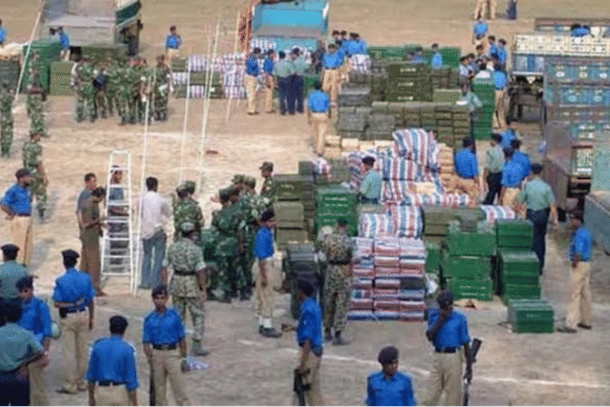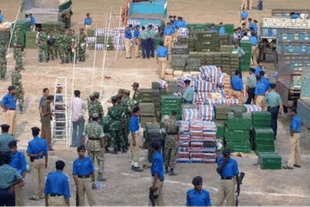World
Commutation Of ULFA Chief’s Death Sentence By Bangladesh High Court Reveals Yunus Government’s Deep Anti-India Mindset
Jaideep Mazumdar
Dec 19, 2024, 12:45 PM | Updated 12:52 PM IST
Save & read from anywhere!
Bookmark stories for easy access on any device or the Swarajya app.


The High Court (HC) Division of Bangladesh’s Supreme Court commuted a death sentence on ULFA (Independent) chief Paresh Barua to life imprisonment and acquitted six others who had been sentenced to death in an arms smuggling case.
The obnoxious order delivered Wednesday (18 December) by a two-judge HC bench comprising Justice Mustafa Zaman Islam and Justice Nasreen Akhter has been issued at the behest of the interim government in Bangladesh headed by Muhammad Yunus.
The case dates back to April 2004 when 10 truckloads of arms, ammunition, explosives, and other military hardware meant for the ULFA were seized by Bangladesh’s police and coast guard while being unloaded at a jetty belonging to a fertiliser company in Chittagong.
The huge consignment of arms was arranged for the ULFA by Pakistan’s Inter-Services Intelligence (ISI). The ULFA would have kept a portion of the arms in its armoury and had planned to sell the rest to other militant groups in the North East.
More than 50 people, including senior politicians, army, and intelligence officials, and others were charged and found guilty of the arms smuggling case that happened when a coalition government headed by the Bangladesh Nationalist Party (BNP) and the Bangladesh Jamaat-e-Islami were in power.
Those found guilty by the courts included Jamaat’s former ameer and the then industries minister Motiur Rahaman Nizami, junior home minister Lutfozzaman Babar, former chief of Directorate General of Forces Intelligence (DGFI) Major General Rezzakul Haider Chowdhury, former chief of National Security Intelligence (Bangladesh’s principal civilian intelligence agency) Brigadier General Abdur Rahim, the agency’s director, Wing Commander Sahabuddin Ahmed, former senior bureaucrat Nurul Amin, two senior executives of the fertiliser company, and some others.
According to Indian intelligence agencies, the Bangladesh police and coast guard were not in the know about the covert operation that was being carried out with the knowledge, blessing, and connivance of the government at the time. Senior government figures were also involved.
The police and coast guard acted on a tip-off and raided the jetty. The seizure of such a large quantity of arms attracted instant media attention, and the coalition government of BNP and Bangladesh Jamaat-e-Islami found it impossible to hush up the case.
In 2014, 14 of those charged, including Paresh Barua, were sentenced to death. Barua and Nurul Amin (an additional secretary in the industries ministry) fled the country before they could be arrested.
Jamaat’s Nizami was hanged to death in May 2016 after being convicted of heinous crimes and collaborating with West Pakistani forces during the 1971 liberation war.
Yunus Government’s Role in Acquittals
An appeal against the death sentences was filed before the HC in early November. Deputy attorney general Sultana Akhter Rubi and assistant attorney general Mohammad Aseef Imran Zeesan, both of whom represented the government, did not contest the appeals.
The two senior law officers (Rubi and Zeesan), who were appointed by the Yunus administration, were instructed not to contest the appeal.
It can be safely assumed that the HC bench also received instructions from the Yunus administration to commute Barua’s death sentence to life imprisonment and, more importantly, acquit the six on death row.
Bangladesh’s judiciary, which has always bowed to the dictates of those in power in the country, has become supine after the fall of the Sheikh Hasina government.
In the days following Hasina’s flight to India, a number of judges of the Supreme Court and High Court were forced to resign and were replaced with those considered close to Yunus, the other ‘advisers’ (de facto ministers), and also the Jamaat.
There is, thus, a strong case that the pliant judges followed the instructions of the Yunus government and acquitted the six on death row.
A senior Bangladesh Supreme Court lawyer said Wednesday’s acquittal order by the HC has surprised many lawyers.
“When appeals are filed, evidence that can prove the innocence of the convicted is submitted. Or the pleas are based on substantive grounds. But no substantive grounds were provided and no evidence was submitted to prove the innocence of the convicted,” the lawyer told Swarajya over the phone from Dhaka.
“The acquittals are a new low in the sorry history of Bangladesh’s judiciary that has often done the bidding of the government. This supplication of the judiciary has become even more blatant now,” the senior lawyer who usually argues civil cases and has a thriving practice added.
Message to North East Rebel Outfits
The HC order provides a strong signal of Yunus’ sinister intent.
It is a clear ‘welcome back’ message to the militant groups of the North East. The Hasina government had driven out all the North East rebel outfits of Assam (ULFA and the Bodo outfits), Manipur (UNLF and PLA), Bengal (KLO), and Nagaland (the NSCN) out of the country.
Though most of these outfits have either been decimated or have entered into peace deals with the government, disgruntled and hardline elements from among them still exist.
The prospect of a safe haven in Bangladesh, as well as the promise of material and military aid by the ISI, which is once again active in Bangladesh, will motivate some hardliners to resurrect their outfits or form new ones.
Many senior figures in the Yunus administration, as well as some leaders of the students’ movement that led to the uprising against Hasina, had been openly declaring their intention to destabilise the North East and make the region a part of Bangladesh.
A couple of days ago, Mahfuz Alam (read about him here), a powerful figure in the Yunus government, posted on social media that Bangladesh needs to expand and acquire large parts of Bengal, Assam, Meghalaya, and Tripura.
Alam, a hardcore Islamist who is suspected to have been a member of the banned terror outfit Hizb-ut-Tahrir, posted a map showing large parts of these Indian states included in Bangladesh. Though he deleted the post after an outcry, it is significant that Yunus and others in the government silently supported Alam.
Yunus, who is building strong ties, including military ties, with Pakistan, has already allowed the ISI to re-enter his country.
Wednesday’s order by the HC in Dhaka sends a clear message to all the rebels in the North East that the Yunus government would welcome them and provide not only safe havens but also facilitate training, arms, and sustenance to them.
It may be mentioned that the arms, ammunition, and other military hardware that were seized while being loaded onto 10 trucks from a ship that had reached Chittagong port from China’s Beihai port on the night of 1 April 2004 was valued at the time at US $17 million.
The arms were being off-loaded from the ship at a jetty belonging to the state-owned Chittagong Urea Fertilizer Limited (CUFL). The arms haul was spectacular: 4,930 different types of sophisticated firearms; 27,020 grenades; 840 rocket launchers, 300 rockets, 2,000 grenade-launching tubes; 6,392 magazines; and 1,140,520 bullets, besides some other military hardware.
“The supply of these arms and ammunition and other hardware to the ULFA and, through the ULFA, to other militant outfits of North East India was clearly meant to destabilise the region and was an act of war against India. By getting the death sentence on the ULFA chief commuted and getting the others acquitted, the present government in Bangladesh has engaged in another hostile act against India,” security affairs expert Major General (retired) S K Singh, who had conducted several counter-insurgency operations in Assam and Manipur in the 1990s, told Swarajya.
The Yunus government’s apparent complicity in the acquittals amounts to a declaration of hostile intent and should be met with a firm response, Singh added.





